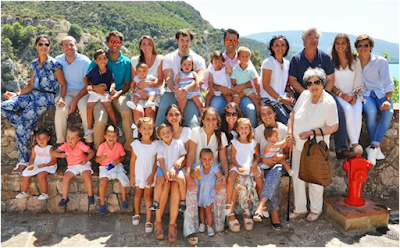Keep A Joyful Hope
November 28, 2023
Hi! How is each and every one? Isn’t it providential? We are in the last days of November, the first and second days of which we celebrated the Solemnity of All Saints and All Souls. With the Holy Father we lived the rest of the month praying, offering and fasting for the Holy Souls in Purgatory and the Church militant in the countries at war. Last Thursday was Thanksgiving Day in many parts of the world. Last Sunday was the Solemnity of Our Lord Jesus Christ the King of Heaven and Earth.
It is a time for great
hope and trust in the Lord. Remember He is
the King of the Universe. He is in
control. But He expects each and every one of us to do our part of becoming
better children of His and brothers of Jesus Christ, His beloved Son.
The following excerpt
continues to talk to us more and more about hope hidden behind our brokenness (From
Broken Gods, Hope, Healing, and the
Seven Longings of the Human Heart, Gregory K. Popcak, Ph. D. Ch 2).
Deadly Sins Versus Divine Longings
And so, as I asserted at the beginning of this
section, the seven deadly sins are actually a sign of hope because, despite
their best attempt to obscure them, their very presence reveals the existence
of the seven divine longings of the human
heart, namely, our deep, hidden, but inescapable yearnings for abundance, dignity, justice, peace, trust,
well-being, and communion, respectively.
These seven divine longings have such tremendous potential to propel us
toward divinization that Satan works hard to keep them hidden where we are
least likely to look, behind the parts of ourselves we hate the most.
Virtue: Not Enough?
Over the centuries, the church has presented the
seven heavenly virtues as the classic antidote to the seven deadly sins. For instance, pride is meant to be healed
through humility, envy by kindness,
wrath by patience, sloth through diligence, greed through generosity,
gluttony through temperance, and lust
by chastity. These ancient spiritual antidotes have been
reaffirmed over centuries of practice and reflection. Yet there are three common problems that
occur when people try to counter the deadly sins with the heavenly virtues.
First, people often have a poor understanding of
what these virtues require. For example,
discovering that patience is the antidote to wrath, many believe that they
should feel guilty if they experience even the slightest irritation with
someone who has hurt them terribly.
Similarly, knowing that humility is the antidote to pride, many believe
that they should never speak or think well of themselves or rejoice in their
talents or accomplishments. Neither of
these ideas is true. Despite our best
intentions, if we don’t understand what the heavenly virtues really ask of us,
our attempts to avoid one serious error can bring on a different but equally
serious problem.
Second, when people learn that the seven heavenly
virtues are the antidotes to the seven deadly sins, they tend to think that we
have to practice the seven heavenly virtues in order to “be good.” This idea misses the point entirely. Heaven is not so much for the good as it is
for the godly. Our divinization is
driven by the strength of our
relationship with God, not by the “goodness” we have achieved by our own
efforts. Goodness may be one of the
visible signs of that relationship (see Jas 2:17), but not always. We can be good for all the wrong
reasons. Some people are good because
they are afraid they won’t be liked if they don’t toe the line. Others are good because they want to get
something out of you. For the Christian,
goodness is not a goal in and of itself. It is the fruit of an authentic and
vital relationship with Christ. There is
a reason that love, joy, peace, patience,
kindness, generosity, faithfulness, gentleness, and self-control are
identified as the fruits of the
spirit and not the roots of the spirit.
The root, or basis, of these virtues is our relationship with
Christ. Pursued on their own without
this relationship solidly in place, even the greatest virtues become “a noisy
gong or a clanging cymbal” (1 Cor 13:1).
Third, for many people “being good,” per se, is rarely a very powerful motivator. Of course, we would very much like to be good and for others to think we’re good. We just seem to consistently want goodness less than we want whatever pleasure is dangled in front of us at the moment. As Oscar Wilde famously put it, “I can resist everything but temptation.” The more many of us try to fight directly against our sins, the more we seem to get trapped in them.
Just remember, there is
hope. You and I can become the saints
God wants us to be. We simply do as Jesus
tells us through the Holy Spirit and His mother, our mother Mary.
See you in the next post,
“May
tomorrow be a perfect day; may you find love and laughter along the way; may
God keep you in his tender care; ‘til He brings us together again.”
Affectionately,
Guadalupinky












Comments
Post a Comment